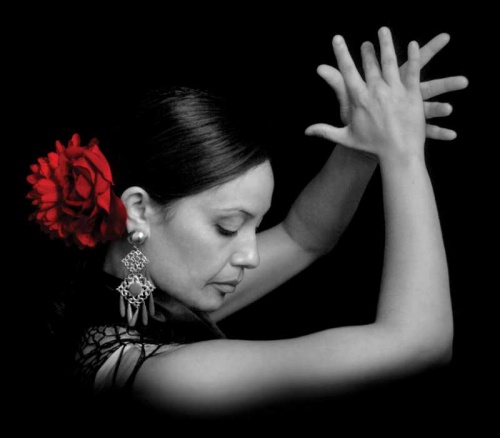Flamenco Tablao / The Cry of Spain
28/04/2006 - 29/04/2006
Production Details
Desde Sevilla Flamenco Dance Company
Pounding rhythms and the mesmeric call of flamenco guitar and percussion herald Desde Sevilla Flamenco Dance Company’s return to the stage with an entirely new show, Flamenco Tablao. This time,
The Front Room in
Flamenco music and dance is the perfect medium to portray the intensity of
Dancers
Helene Garland
Jessica Garland
Jill Tanner-Lloyd
Tracey Mihare
Musicians
Mark Edwards - flamenco guitar
Alan Burden - percussion
Rolando Olmedo - narrator
Dance , Flamenco ,
2 hrs 15 mins incl. 2 intervals
Paradox in passion
Review by John Smythe 29th Apr 2006
Flamenco is a dance of contrast and contradiction, if not paradox. Possessed of the dispossessed it is at once a dance of defiance and deep sensuality. It contains and expresses passion and, as with all emotions in dramatic performance, its is what is contained, constrained, restrained that gives power to what is finally expressed.
Flamenco is also about community and individuality, relationship and singularity. Villagers gather – as today’s hip hop or kapa haka exponents may – in the street, square or park, to develop and trade skills and show off then, in performance, to express their personal and collective hopes and fears, loves and losses, strengths and vulnerabilities. With a distinctively Spanish intensity and humour, flamenco celebrates and commemorates life.
For two nights only leading exponents from the Wellington-based Desde Sevilla Flamenco Dance Company are presenting a complementary mix of Flamenco Tablao – ideally located in The Front Room (previously the James Cabaret) – and political dance drama that uses flamenco to commemorate the 70th anniversary of New Zealand volunteers’ participation in the Spanish Civil War in The Cry of Spain.
Four female dancers and two male musicians mesmerise, challenge and excite their audience for over two hours in a cabaret venue with a bar and bar menu to enhance the experience and add to the atmosphere. The hollow rostrum stage resounds splendidly to the pounding it gets.
Flamenco guitarist Mark Edwards is simply superb, tickling and massaging every mood possible from his six strings. Percussionist Alan Burden also works wonders with his sit-upon tea chest and hands, resorting occasionally to brushes, sticks and even a snare drum for a more military feel.
While it is most often the musicians who begin a sequence, it’s the dancers who take their offerings and lead. The symbiotic relationship between musicians and dancers is a major part of the magic – duende – which, verging on the supernatural, is better experienced than explained.
Also notable is the age range of the dancers; the inclusiveness that simultaneously honours maturity and experience – in life as well as the dance form – and welcomes new blood.
In the flamenco tablao el primero and el final that bookend the show, Helene Garland’s 24 years as a learner, performer and teacher of flamenco dance imbues her dance with a defiant authority that she leavens with touches of cheekiness and wickedness (also part of duende).
Jill Tanner-Lloyd, who also brings more than two decades of adult experience to her work – much of it in London, Madrid and Seville – contrasts an earthy sensuality with determined declarations of status, not least in her lead role in The Cry of Spain.
Tracy Mihaere, just five years with the group, has the flashing dark eyes and physical charisma that cannot help but connect the posture dancing of her cultural roots (Ngati Kahungunu) with flamenco.
For me the most outstanding performer is Jessica Garland (daughter of Helene). Born into it and dancing since she was five, with extensive study in Seville behind her, her technique is exquisite. Whiplash transitions bring her from introspection to full expression. While her feet and whole body encompass the pounding rhythms and reflexive forms of flamenco, her hands also attract the eye as they reach, caress, shimmer and slice.
Chilean refugee drama tutor and director Rolando Olmedo, who has been in NZ 30 years, joins the ensemble to narrate The Cry of Spain, drawing on the poetry of Paoblo Neruda. Here the dancing is much more formalised and of course the dualities of flamenco lend themselves readily to expressing the conflict between fascism and socialism. In this its debut performance some of the women were yet to claim the full ownership of the work that they bring to their flamenco tablao sequences. It is powerful nevertheless.
The flamenco tablao el final reclaims the life-force against all odds with its energising blends of free-form and pre-determined solo, duo and ensemble dancing in wondrous synchronicity with the pulsating, wafting, surging, flowing music.
If anything is missing it could be a sense of sheer joy and lightness of being, above and beyond the core intensity of their work. Presumably that is something that can only arise where a group such as this is able to perform longer seasons.
[For venue and booking details, go to http://www.feelinggreat.co.nz/arts/event/dance/ .]
Copyright © in the review belongs to the reviewer





Comments